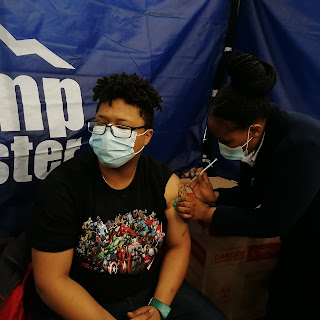With winter season around the corner, the National Department of Health has urged the public to take extra precautionary measures to protect themselves and their loved ones against respiratory infections, which are expected to increase over the cold and rainy season.
 PICTURE - Bush Radio: Bush Radio's logistics and programming intern, Renato van Schalkwyk getting inoculated
PICTURE - Bush Radio: Bush Radio's logistics and programming intern, Renato van Schalkwyk getting inoculatedAccording to the department, the respiratory syncytial
virus (RSV) is currently at peak circulation in the country, while influenza is
starting to increase. Meanwhile, COVID-19 infections continues to circulate at
low levels.
The National Institute for Communicable Diseases (NICD),
which monitors the circulation of respiratory viruses throughout the country,
has notified the department that it is currently the peak season of RSV, which
some can confuse for COVID-19 due to common symptoms.
According to the department, RSV causes illness mainly in
young children but may also contribute to respiratory disease in older people.
“Influenza virus season usually follows RSV, and we are
starting to see an increase in cases. While most diseases caused by influenza,
RSV and SARS-CoV-2 viruses are mild, they may cause severe illness and even
death amongst the citizens around the country, particularly in individuals with
conditions placing them at high risk of severe disease,” the statement read.
The health department says the flu season is expected to
start in the next few weeks and the department is advising those at high risk
of contracting the virus to get the flu vaccine to prevent severe health
complications. Groups at high risk include the elderly who are over 65 years
old, those with underlying illnesses such as heart and lung disease, people
living with HIV and tuberculosis, as well as pregnant people.
The flu vaccine is available in public clinics free of
charge on a first come, first serve basis to people falling into the high-risk
category, while private pharmacies also sell the vaccine.
The flu virus spreads mainly from one person to another by
respiratory droplets and co-infections with other respiratory viruses can
occur.
‘’Hence it is important for people to always cover their
nose and mouth when they cough or sneeze, stay at home when sick, not to touch
one’s face with unwashed hands; and avoid close contact with others when sick(
especially those at risk of severe disease), such as kissing, shaking hands, and
sharing cups and eating utensils.’’
 PICTURE - Bush Radio: Bush Radio presenters, Jasnine Roberts and renato van Schalkwyk, protecting themselves by wearing a mask
PICTURE - Bush Radio: Bush Radio presenters, Jasnine Roberts and renato van Schalkwyk, protecting themselves by wearing a mask‘’People infected with influenza are usually contagious for
3 to 8 days. Preventative measures such as wearing of masks and social
distancing are recommended for especially for those who are ill,’’ said Foster
Mohale, Department of Health spokesperson.
Done by: Mitchum George
Comments